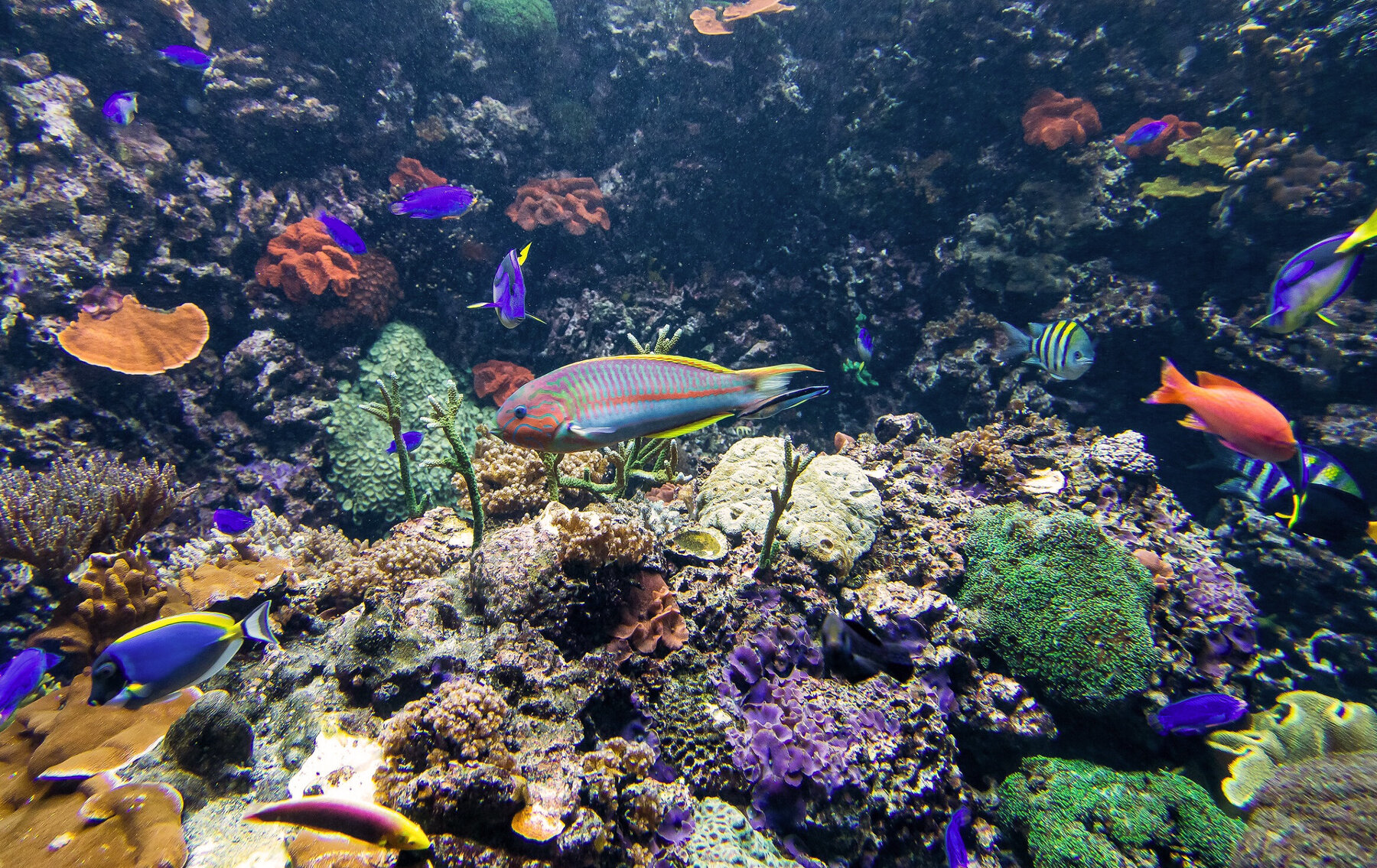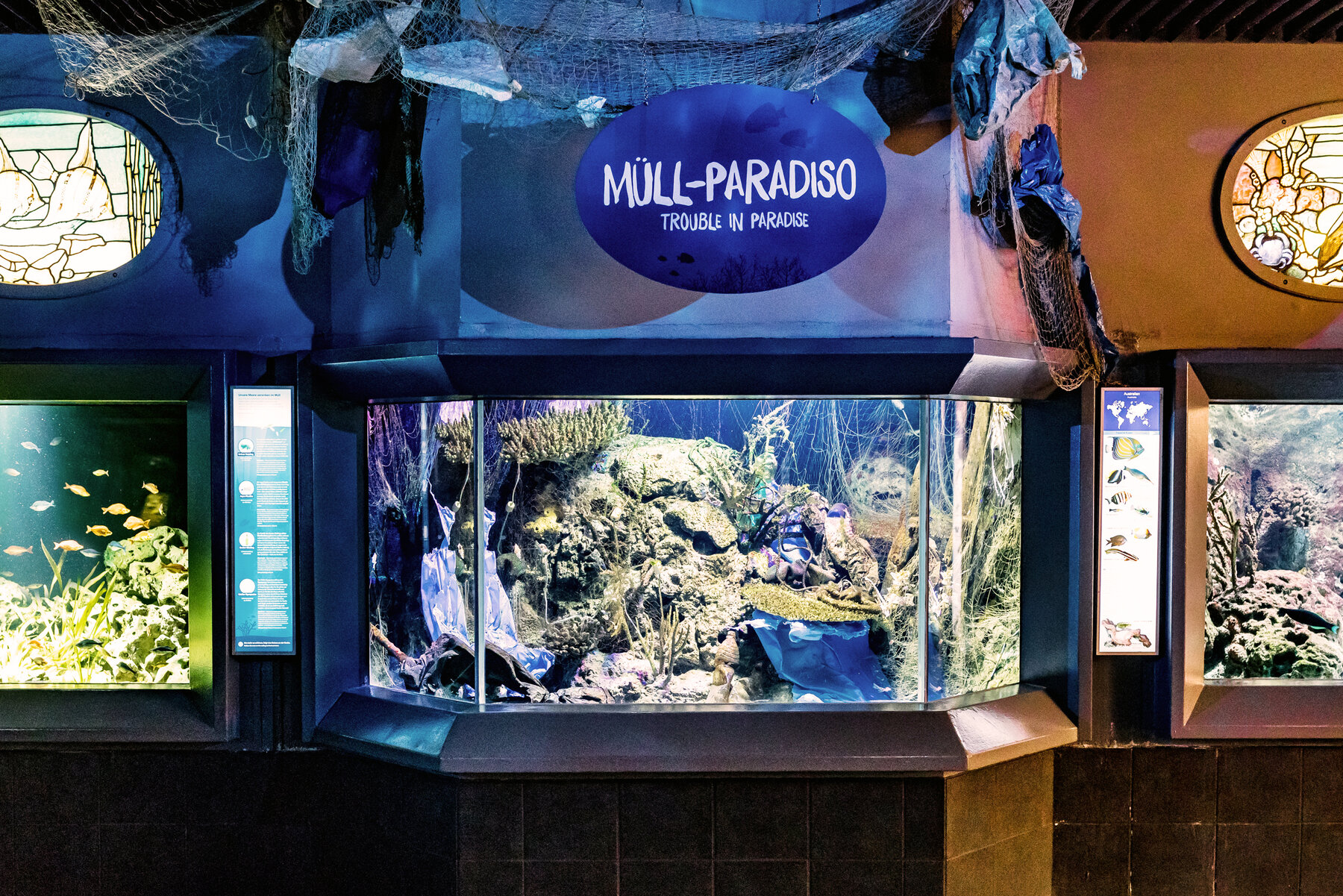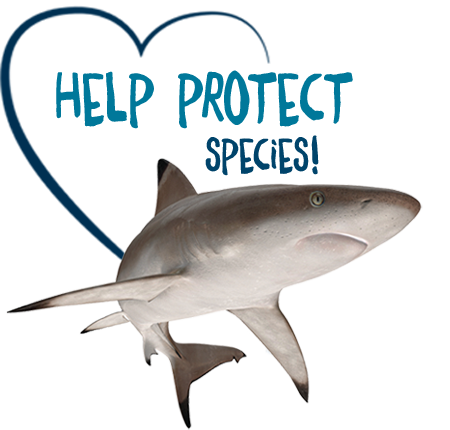
Species conservation every day
Using resources sparingly, looking after nature, helping to save species – Zoo and Aquarium Berlin provide ideas and examples of how to protect biodiversity every day. Learn how you can make a daily difference yourself and become a conservation hero!
"Change starts with us as individuals"

Poaching, climate change, and habitat destruction are the most common causes of species extinction – and they are all caused by human activity. But preserving biodiversity is important for all of our futures, because the natural world is a cycle in which all life forms impact on and depend on each other.
If this cycle is broken, the entire natural process is disrupted. Every time a plant or animal species dies out, the impact of that is felt by others. Humans are a part of the Earth’s biodiversity, and rely just as heavily on variety in the natural world as other animals and plants. Here’s what you can do:
Every day, tonnes of plastic waste enter the world’s oceans, destroying the habitats of many different organisms that live there. Scientists estimate that by the year 2050, there will be more plastic than fish in our seas. Even plastic products that are more easily degradable, such as yoghurt pots, still leave behind small particles known as microplastics that are swallowed by animals and remain undigested in their bodies – which also means that a lot of this plastic ends up on our plates. It is therefore extremely important to make the right decisions when shopping: use cloth bags or shopping baskets rather than plastic bags; avoid unnecessary packaging; choose reusable containers over single-use plastic bottles, cartons and cans – or, even better, support your local packaging-free grocery store.
Go one step further: Be sure to properly recycle all unavoidable waste, and – as part of the Take 3 for the Sea initiative – take three pieces of rubbish with you whenever you leave a beach or other public place. It only takes a few minutes to help tackle our throwaway culture.
Meat used to be a luxury product that most families could only afford to eat once a week. Today, it has become the norm for many people to consume meat multiple times a day. In recent decades, meat consumption per capita in Germany has doubled to around 60 kg per year. Reducing our meat intake is not only important to combat factory farming, it is also good for the climate. Producing one kilo of beef releases three times as much CO2 as pork, and chicken is lower, but the friendliest item on the menu in terms of carbon footprint is vegetables. Producing vegetables is more eco-friendly than producing dairy products or even fruit – generating just one hundredth of the CO2 released in beef production. We also often forget that meat is already a kind of processed food, as in order for chickens, pigs and cows to produce plenty of meat, they are fed with corn, soy or wheat. To cultivate this animal feed, forests are often cleared and wild animals lose their home. Growing food for meat production also takes up land that could be used to feed hungry human mouths. A recommended first step for avid meat-eaters is to introduce one meat-free day per week. The more advanced can try a revival of the traditional Sunday roast, and will quickly realise that only eating meat once a week doesn’t mean compromising on taste and variety. The motto here is definitely quality over quantity.
Go one step further: Buy regional and seasonal produce that contains no palm oil. The following labels are a good indicator of more sustainable produce: MSC, FSC, Rainforest Alliance Certified, Blue Angel.
It’s not only tigers, elephants and rhinos that are threatened with extinction – some species right here at home are also in danger. The good news is that every one of us can help create refuges for these threatened animals. It can be quick and easy to create little natural ecosystems – in your garden, on your balcony, or somewhere in your neighbourhood. These small efforts can be a big help in combatting the habitat loss that is having an increasing impact on our native species. Insect hotels, nest boxes, and pollen-rich plants can help birds, butterflies, ladybirds and bees find that little patch of wilderness they need to thrive. Even well-manicured gardens can be a haven for nature.
Go one step further: Use compost rather than chemical fertilisers; buy peat-free potting soil; don’t cover earth with tarmac, concrete, or paving stones; grow a variety of plants; leave fallen fruit on the ground; don’t remove every single leaf from the lawn or flower beds. For more ideas, visit www.letitgrow.eu
Electricity has become a basic need for most people in the world. No electricity means no light, no fridge, and no Facebook! The average German may use only half the electricity of the average person in the United States, but our dependency on electricity has significantly increased in recent years. In fact, our electricity consumption per head has tripled since the 1960s. But small changes in our household habits can make a big difference: keep the lid on the pan when cooking; turn devices off rather than putting them on standby; heat water in the kettle instead of on the hob; only run the dishwasher and washing machine with a full load; make sure your fridge is well ventilated by placing it a sufficient distance from the wall and away from the oven or a radiator; and regularly defrost freezers and freezer compartments. If you do all this, you can save up to 45 percent of your household energy consumption.
Go one step further: Only turn the heating on when it’s really necessary – thick socks, blankets and jumpers are often sufficient until winter starts to bite; turning the thermostat in your apartment down by just one degree saves five to ten percent of heat energy and therefore heating costs too; bursts of ventilation for a few minutes are more efficient than having a constantly cracked-open window; source your electricity from renewable energy providers; only buy electronic devices in energy efficiency classes A+ and above.
Vintage, retro, shabby chic – because used items possess a special charm, a lot of furniture, clothing and home décor is now artificially aged. But it’s best to get the real thing! Whether it’s your mum’s flares from the 70s, grandad’s oak cabinet, second-hand toys from eBay, or a coffee pot you found at a flea market in France, objects with a previous life have character and can help keep memories alive, bearing visible signs of an eventful history. In the best cases, these items contain an unusual or personal story that turns them into genuinely one-of-a-kind pieces. Car-boot sales, flea markets, public bookcases and online exchange platforms can be veritable treasure troves for vintage-lovers, bargain-hunters, and people who care about their environmental impact and the careful use of raw materials. Plus, in many second-hand shops, the money spent also goes towards a good cause. The upcycling trend offers another creative way to combat our throwaway culture.
Go one step further: Non-profit, socially minded department stores and charity stores are often happy to receive goods that can no longer fetch cash at flea markets or on online platforms. And even gifts don’t have to be brand-spanking new – many shops, including the Zoo Shop, sell original products from recycled materials.
Without water, no life could exist on our planet. And this life-sustaining element is found in the most unlikely of places. In the home, most drinking water is lost through flushing, showering and bathing. But did you know that even a thin sheet of A4 paper uses up water? It takes around ten litres to produce it. To make one cup of black coffee, a total of 140 litres of water is actually required. Several thousand litres of water are used in the manufacture of a single pair of jeans, and just one kilo of beef requires around 15,000 litres of water before it lands on our plates. Once you see how much water is used where, you can be more aware of your own water consumption and make changes in your daily life.
Go one step further: Use the water-saving flush on your toilet; turn off the tap while brushing your teeth; turn off the shower when lathering and shampooing; only use the washing machine when it’s full; and use rainwater wherever possible.
Compared to diesel and petrol, biofuel made from rapeseed, wheat or palm oil releases significantly less CO2 when burned. However, it is not necessarily any better for the environment. Rainforests are cleared to make way for palm oil plantations, and the agricultural production of biofuels also contributes to CO2 emissions. Electric cars may improve air quality in cities, but if this electricity is generated from coal then the carbon emissions are simply being shifted to another place in the chain. With all these things to consider, it can be difficult to make the right decision. The simplest rule to abide by is: the less you use a car, the better. In the city, it can sometimes be quicker to reach your destination on foot, by bike, or with public transport – which, when you take into account parking fees, can also be the cheaper option.
Go one step further: For those who want to save on the cost of a car but don’t want to give up the luxury of car travel entirely, taxis or car sharing can offer a cheaper alternative. And, if you must own a car, definitely avoid SUVs – they are the biggest polluters of all cars.
The illegal trade in animals and animal products poses the greatest immediate threat to many endangered species, including tigers, elephants and rhinos. Particularly in Southeast Asia, this trade is booming. Do you have a trip to Asia planned? If so, you can become a species protection hero by using the Wildlife Witness App to report whenever you encounter products such as rhino horn, bear paws, or turtle eggs at a market, pharmacy or restaurant. A simple photo can make an active contribution to saving threatened species. To find out what to look out for and to download the app, visit www.wildlifewitness.net
Go one step further: Don’t buy food, medicines or other products made from threatened species (ivory, crocodile skin or snakeskin, tiger claws); don’t get a photograph posing with supposedly tame wild animals; and choose rail travel over air travel whenever possible. For those who are not jetting off to far-flung destinations, holidays still offer a great opportunity to contribute towards species conservation – for example, by counting garden birds or wintering birds for censuses organised by local nature protection organisations.
Aquarium Berlin is a charitable institution that is committed to protecting biodiversity. We promote species conservation efforts here in Berlin and around the world. Our zoologists have regular discussions with international experts to find out where donations are needed most urgently and where they can be used most meaningfully in those locations. All the donations we receive for species conservation are put towards these projects. So just by visiting Aquarium Berlin, you are already supporting important work to protect endangered species.
Ant and bee colonies set an example for us all: together, we can make a big difference! It is important that we share our knowledge with friends and family and pass on these practical daily tips. Let’s work together to create a better future for our planet.
